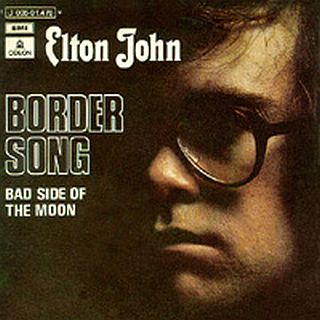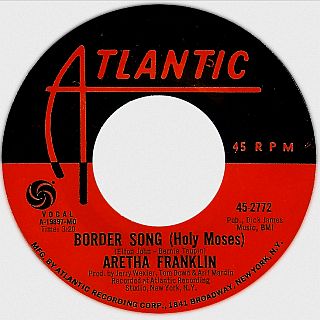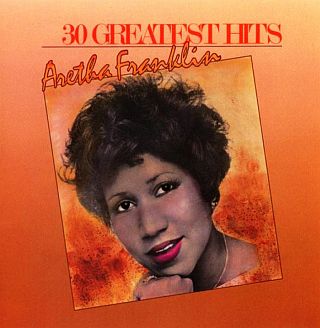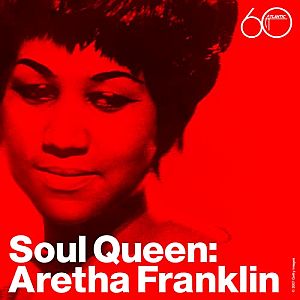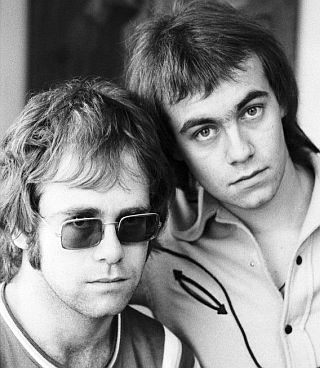 Elton John and Bernie Taupin, the song-writing pair who turned out an amazing run of 1970s hits. |
“Border Song” is an Elton John and Bernie Taupin song originally performed by John for his 1970 self-titled second album, Elton John. It was also the album’s first single released in the spring of 1970.
The song, about half-way through, has a rousing, gospel-style sound to it. But upon its release, the song failed to get much attention. Then, a bit later in America, singer Aretha Franklin became interested in recording it. More on her involvement in a moment.
Music Player
“Border Song”- Elton John
1970
“Border Song” was one of the early Bernie Taupin/Elton John collaborations, presaging a 50-year partnership between the two, with Taupin writing the lyrics and John supplying the music. Their lives had converged when they were just starting out, both vying for songwriting jobs in London. Then they discovered their complementary talents.
Taupin was a country boy and farmer’s son from outside the city, while John was city-bred. But in this particular song, Taupin’s lyrics take issue with the London music scene he came to experience and his alienation in that environment: …Brand of people who ain’t my kind… / Please excuse my frankness, but it’s not my cup of tea… And more…
Yet, over the years, the song morphed into something more than just Taupin’s unease with the London music scene, and came to be regarded as a message of tolerance, anti-bigotry and human acceptance.
In fact, John, who rarely wrote lyrics, did pen the last verse of “Border Song” which adds the tolerance and “let-us-live-in-peace” sentiments.
The song was one of the first Elton John singles released in March 1970. It featured John’s vocals, his strong piano performance, plus a generous gospel-style chorus. However, the song did not chart in the UK. In North America a few months later, it did better. In Canada, it peaked at No. 34, and thereby became Elton John’s first chart appearance in any country. In the U.S., meanwhile, during October 1970, the song broke into the Billboard Hot 100 at No. 92, and No. 69 on the Cash Box chart. But good news on the song was soon to come from another quarter.
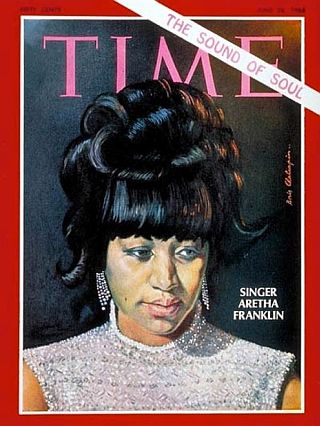 Aretha Franklin on the cover of Time, June 28, 1968. |
American recording artist Aretha Franklin decided in 1970 that she wanted to do a cover version of “Border Song.” Aretha was 28 at the time, at the peak of her rising stardom, and involved with civil rights. An accomplished songwriter herself, Franklin by then was dubbed the “Queen of Soul” and had a string of hit songs, among them: “I Never Loved a Man (The Way I love You),” “Respect,” “Natural Woman,” “Think,” “Chain of Fools,” and others. She had also graced the cover of Time magazine in June 1968 for a feature story about soul music.
But it was in the fall of 1970 when word got out that she was planning to record Elton John’s “Border Song.”
Although Elton John by then had his American performance debut at the Troubadour club in Los Angeles in late August 1970, the news that Aretha Franklin would be doing a cover of “Border Song” was a big affirmation for both he and Bernie Taupin.
Years later, on tour, John would regale audiences about how they received the news. He explained that he and Taupin nearly “pissed our pants” with excitement, knowing what Aretha Franklin’s performance of their song would mean for their newly launched careers.
Music Player
“Border Song”- Aretha Franklin
December 1970
Aretha, having been reared in the gospel tradition, gave the song her own special interpretative treatment and no doubt saw it as useful for civil rights messaging, as per the final verse: Let us strive to find a way to make all hatred cease / There’s a man over there, what’s his color? Do you care / He’s my brother, let us live in peace.
Her version, led by her own singing and piano playing, was backed with great instrumentation and gospel-styled vocals from the Sweet Inspirations. In addition, on listings of her version, and on the single’s record label, she parenthetically added “Holy Moses,” the repeated and familiar refrain from the song as an additional identifier. In some of her performances of this song, in the final verse, she added a few more lines and special emphasis in places, as with the collective “we”: “Lord, help me now / Holy Moses, can we live in peace? / Holy Moses, can we live…/ I wonder can WE, can WE, can WE — live in peace?”
|
“Border Song” Holy Moses, I have been removed Holy Moses, I have been deceived I’m going back to the border Holy Moses, let us live in peace |
Aretha’s version was released as a single in December 1970, and it fared better on the music charts than the original John/Taupin version, reaching No. 37 in the Billboard Hot 100 and No. 23 on the Cash Box chart. In the Netherlands the following January, it hit No. 29 on the Dutch Top 40. Her version was also included as the closing track on the 1972 Aretha Franklin album, Young, Gifted and Black.
David Graham, writing a review of Aretha’s version of “Border Song” for The Atlantic magazine in 2016, noted:
I heard her recording of “Border Song” on the radio and only realized years later it was by Elton John; I only listened to his rendition as I wrote this. Don’t bother: All you need is this version [Aretha’s version], which takes the ersatz gospel of the original and alchemizes it into the real thing. The main attraction is Aretha’s vocals, but the backing musicians bring it all together — Billy Preston’s organ, Chuck Rainey’s bass, Cornell Dupree’s chorus-drenched guitar solo, but especially the piano playing, which perfects the recording. Who’s that? Just a little-known studio musician named Aretha Franklin…
In later years, Aretha Franklin would collaborate with Elton John on a couple of occasions. On her 1989 album, Through the Storm, which featured some duets with other stars, the title cut was done with Elton John, which was also released as a single that hit No. 16 on the Billboard Hot 100.
Elton and Aretha also performed the “Border Song” together with choir, orchestra and two pianos on her “Aretha Franklin & Friends” duets special in 1993.
Aretha Franklin’s final public performance came at Elton John’s AIDS Foundation benefit held at the Cathedral of St. John the Divine on November 7, 2017 in New York City. Aretha, then quite ill, was doing battle with cancer. Still, at that gathering she performed nine songs. Yet John later noted: “I honestly didn’t know how she could possibly perform,” given her condition at the time. But she did, and in rare form, according to John.
“She raised the roof,” John would say of her performance that night… “I think it’s because she was inspired by being in the cathedral. She went to church. She went back to where she came from and she raised the roof, and she sang, and she played, and she made us all weep. She gave us the performance of a lifetime.” John was reduced to tears by Aretha’s set that night, and he added of her performance: “You don’t see greatness like that very often, and we will never see it again.”
Aretha Franklin died on August 16, 2018, following a long battle with pancreatic cancer. And her funeral was quite the event, attended by political, civil rights, and music royalty.
Following her death, part of Elton John’s tribute to her, posted on Instagram noted:
“The loss of Aretha Franklin is a blow for everybody who loves real music: Music from the heart, the soul and the Church. Her voice was unique, her piano playing underrated – she was one of my favorite pianists. I was fortunate enough to spend time with her and witness her last performance…”
The 2013 edition of The Rolling Stone Encyclopedia of Rock and Roll, noted of Franklin’s career:
Aretha Franklin is not only the definitive female soul singer of the ‘60s, but one of the most influential and important voices of in the history of popular music. She fused the leaps and swoops of the gospel music she grew up on with the sensuality of R&B, the innovation of jazz, and the precision of pop. After she hit her artistic and commercial stride in 1967, she made over a dozen million-selling singles, and since then has recorded 20 #1 R&B hits…
Franklin remains one of the best-selling music artists of all time, having sold more than 75 million records worldwide. In 1987, she was the first woman inducted into the Rock & Roll Hall of Fame, the same year she received the National Medal of Arts and the Presidential Medal of Freedom.
In 2010, Rolling Stone magazine ranked her No. 1 on its list of the “100 Greatest Singers of All Time.” The Pulitzer Prize jury in 2019 awarded Franklin a posthumous special citation “for her indelible contribution to American music and culture for more than five decades”.
For additional music stories, artist histories, and song profiles at this website see the “Annals of Music” category page. There is also a more detailed profile of Elton John’s career and music at, “Elton John’s Decade: 1970s (w/Bernie).”
Thanks for visiting — and if you like what you find here, please make a donation to help support the research, writing, and continued publication of this website. Thank you. – Jack Doyle
|
Please Support Thank You |
____________________________________
Date Posted: 28 March 2021
Last Update: 28 March 2021
Comments to: jdoyle@pophistorydig.com
Article Citation:
Jack Doyle, “Border Song – Elton & Aretha:
1970-72,” PopHistoryDig.com, March 28, 2021.
____________________________________
Sources, Links & Additional Information
“Border Song,” Wikipedia.org.
“Border Song by Elton John,” SongFacts.com.
Elizabeth Rosenthal, His Song: The Musical Journey of Elton John, Billboard Books, 544pp., 2001.
Paul Gambaccini, A Conversation with Elton John and Bernie Taupin, Putnam Group, 112 pp, 1975.
“Aretha Franklin,” in Holly George-Warren and Patricia Romanowski (eds), The Rolling Stone Encyclopedia of Rock & Roll, Rolling Stone Press, New York, 3rd Edition, 2001, pp. 351-352.
“Aretha Franklin,” Wikipedia.org.
David Ritz, Respect: The Life of Aretha Franklin, Little, Brown & Co., 528 pp., 2014.
Tim Roxborogh, “When Aretha Franklin Covered A Song By An Unknown Singer/ Songwriter Named Elton John,” Roxborogh Report.com, March 26, 2017.
“Elton Recalls That Call From Aretha and Border Song,” RTE.ie (Ireland’s National Public Service Media), updated, September 29, 2018.
“Young, Gifted and Black,” Wikipedia.org.
David A. Graham, “Track of the Day: ‘Border Song (Holy Moses)’ by Aretha Franklin,” TheAtlantic.com, April 5, 2016.
“‘Border Song’ Aretha Franklin and Elton John Duet, Live” (from Aretha Franklin & Friends, TV Special, 1993), YouTube.com, posted, December 2008.
Elias Leight, “Elton John Pays Tribute to Aretha Franklin, ‘The Greatest Soul Artist of All Time.’ John Remembers Being Moved to Tears at Franklin’s Final Performance,” RollingStone.com, August 16, 2018.
Gary Graff, “Elton John Honors Aretha Franklin With Detroit Performance of ‘Border Song’,” Billboard.com, October 13, 2018.
Rishma Dosani, “Elton John Was Worried Aretha Franklin Wouldn’t Get Through Her Last Performance,” Metro.co.UK, November 7, 2018.
_______________________________
